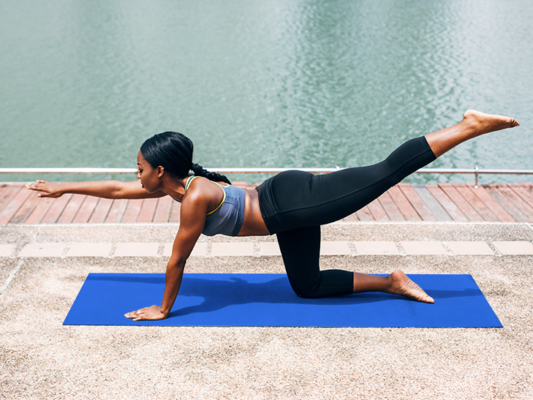About everyday Yoga

Can you do yoga every day:
I haven’t seen this one friend for the past 5 months and when I finally met up with her I was amazed at her body transformation. She told me that the secret to her transformation was that she has been doing yoga every day for the past 140 days. This leads me to the question:
Can you do yoga every day? Practicing yoga every day is possible and encouraged. Benefits such as increased energy, mobility, and flexibility are obtained. When practicing yoga every day it is important to switch up your routine with easy flows and routines that push your body. Having this balance will bring you the most benefit.

“After practicing yoga, many of us notice that our minds feel clearer and calmer and there seems to be a little bit more energy available to us,” says Baxter Bell, MD, a yoga instructor based in the San Francisco Bay Area, who has an individual yoga therapist certification from the International Association of Yoga Therapists (C-IAYT) and is an experienced registered yoga teacher with a 500-hours-of-teacher-training credential from the Yoga Alliance (eRYT 500).
just as you should brush your teeth and get adequate rest every day, practicing yoga should be a non-negotiable element of your daily life. Even if you only step onto your mat for 10 minutes and perform a few poses, the magic of yoga truly starts to unfold when you commit to a daily practice. There are so many styles and ways to practice yoga, when you put them all together for a daily practice you will truly begin to see some drastic changes in your physical health, mental health, spiritual development, and social wellbeing.
Increase Your Flexibility For Better Mobility & Fewer Injuries
One of the obvious benefits of practicing yoga, in general, is increased flexibility. Just think about how much your flexibility improves when practicing one or two times per week, and then think about what the results would be if you began stretching every single day. When you practice yoga every day, you actually have the time to stretch more deeply and target areas specifically. If you’re only practicing a few days per week, you might need to focus on more general full-body sequences.
His reasoning is really simple, the more you practice yoga, the more flexible you will become over time. Keep in mind flexibility is for a lot more than just showing off too – when you’re more flexible, your muscles and joints become more fluid. According to this article from Livestrong, a daily yoga practice may also prevent and reverse bone loss due to osteoporosis.
Improve Strength With Repetition
The key to building strength with your yoga practice is repetition. Whether you practice yoga at home or in a studio, you likely know that yoga is not an easy workout! Even simple Sun Salutations can build strength in your core, arms, back muscles, and leg muscles. Additionally, yoga offers special benefits because it lengthens and strengthens your muscles at the same time, providing you with long, lean muscles. And unless you’re using props, yoga requires minimal equipment to build strength; all you need is your own bodyweight! This type of strength building is known as isometric conditioning and it tones the entire body rather than targeting one muscle group at a time.
Immune System & Anti-Inflammatory
If you’re one of the many people that hates getting sick in the winter, take extra care to spend time on your yoga mat every day! Nothing boosts your immune system quite like a daily yoga session, no matter the length. In fact, according to this article from Yoga Journal, “Yoga helps lower stress hormones that compromise the immune system, while also conditioning the lungs and respiratory tract, stimulating the lymphatic system to oust toxins from the body, and bringing oxygenated blood to the various organs to ensure their optimal function.” And bonus points if you conclude your daily yoga practice with meditation. The same article states that just 20 minutes of meditation can dramatically reduce the incidence of getting ill by lowering cortisol levels, increasing endorphins, and fostering a healthy state of mind.
It May Ease Stress, Anxiety, and Depression
Yoga has long been linked to better emotional wellbeing.
“Just the simple act of taking a few deep breaths can help ease the mind and reduce stress as your body moves through poses,” Ray says. “As you incorporate breath into each movement, the muscles in the body begin to relax and the places we hold our stress and tension start to release.”
The research supporting what many yogis experience themselves is still limited, however.
More research is needed to truly understand how (and how much) yoga benefits mental health. In the meantime, it’s important to remember it’s no replacement for traditional treatment options.
In an August 2020 study in JAMA Psychiatry, adults with generalized anxiety disorder did experience an improvement in symptoms after following regular yoga practice, but yoga wasn’t as effective in the long term as cognitive behavioral therapy.
Yoga May Help You Sleep Better
If you find yourself tossing and turning at night, yoga could deliver sound sleep. Practicing yoga regularly can help people with insomnia fall asleep faster and sleep for longer, according to the National Sleep Foundation.
Through breath and movement, yoga teaches you how to regulate your energy state.
“Mindful yoga practices can activate the parasympathetic nervous system to initiate the relaxation response, which in turn drains off excess nervous energy and lowers arousal levels,” says Brendon Abram, author of Teaching Trauma-Sensitive Yoga and founder of getting Yoga in Ontario, Canada.
It Inspires Self-Confidence
Mastering new poses expand your confidence in your physical strength and your ability to learn something new.
“As the practice builds strength in our bodies and minds, we start to become more confident in ourselves and our decisions,” Ray says. “The practice is a great reminder of how we are stronger than we think, both physically and mentally.”
Improves Your Balance
Whether you’re concerned about getting older or enjoy having an active lifestyle, balance is key when preventing injuries. Practicing yoga every day can help strengthen little muscles in your hands, wrists, feet, and those surrounding your joints. This leads to greater balance and resiliency in the body, and also improves your ability to focus. If you’ve ever practiced a simple balancing posture like Tree Pose or Half Moon Pose you likely know the moment you start thinking about your grocery list or work deliverables you will fall over! With a daily emphasis on balancing poses, you’ll notice how much easier it will be to flow into the pose and experience the sense of serene that comes from combining strength and attention.
How Often Is Too Often To Do Yoga?

The only time yoga is done too often is when the same exact routine is done every single day that requires high intensity. Doing the same routine over and over again will cause RSI (repetitive stress injury).
Doing these high-intensity routines without any type of rest is also going to prevent you from Try devoting short sessions of 15 or 20 minutes to your practice, says Bell. “Even if you do this every day or with just one or two days off a week, the risk of overuse from postures would be relatively low,” he says. And it’s a great way for beginners to get into it, he adds.
